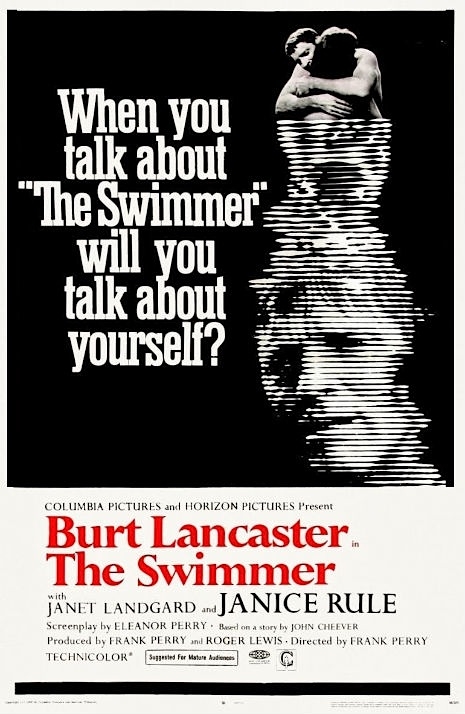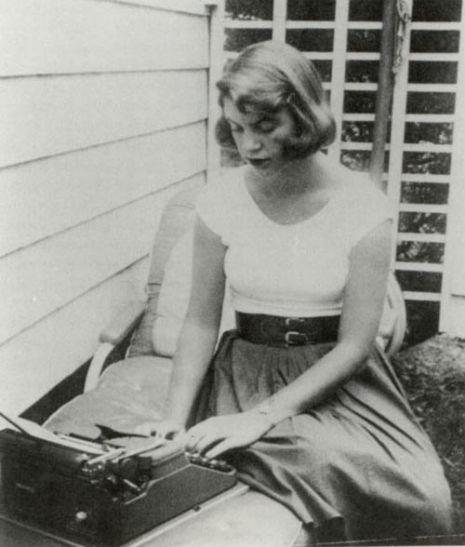
Author John Cheever made a fleeting appearance in the film adaptation of his story The Swimmer during the summer of 1966. He played John Estabrook, a party guest at one of the homes Burt Lancaster’s character Ned Merrill visited on his journey to swim pool to pool across the county. In a letter to a friend, Cheever described his day’s filming:
What I was supposed to do was to shake hands with Lancaster and say “You’ve got a great tan there, Neddy.” Things like that. I was supposed to improvise…
So we rehearsed about a dozen times and then we got ready for the first take but when this dish [actress Janet Landgard] came on instead of shaking hands with her I gave her a big kiss. So then when the take was over Lancaster began to shout: “That son of a bitch is padding his part” and I said I was supposed to improvise and [director] Frank [Perry] said it was all right. I asked the girl if she minded being kissed and she said no, she said I had more spark than anybody else on the set…
Lancaster heard her. Anyhow on the second take I bussed her but when I reached out to shake Lancaster’s hand the bastard was standing with his hands behind his back. So after the take I said that he was supposed to shake hands with me and he said he was just improvising. So on the third take I kissed her but when I made a grab for Lancaster all I got was a good look at his surgical incision in the neighborhood of his kidneys. We made about six takes in all but our friendship is definitely on the rocks.

John Cheever was an established writer by the time the movie was made. He sold his first short story “Expelled From Prep School” in 1930 when he was eighteen years old. He sold his first story to the New Yorker two years later and went on to publish 120 stories with the magazine. His first novel The Wapshot Chronicle was published in 1957. Cheever originally intended his story “The Swimmer” as a full-length novel, with each chapter set in one of the 30 neighboring pools Ned swims across on his way home to his wife and family. He had been “kicking around” an idea of retelling the Greek myth of Narcisus which, according to his biographer Blake Bailey, was loosely inspired by his meeting Ned Rorem, with whom he had a brief sexual relationship, at an artist’s community in Saratoga Springs:
...[Cheever] had in mind a fellow Yaddo guest whom his meeting for the first time that September, composer Ned Rorem, who’d just broken his ankle and was hobbling about with a little plaster cast. As a reader of Freud, Cheever tended to equate homosexuality with narcissism, and in this respect the (almost) forty-year-old Rorem struck him as a kind of wistful, aging boy: “[H]e seems, in halflights, to represent the pure impetuousness of youth, the first flush of manhood, Cheever wrote. “He intends to be compared to a summer’s day, particularly its last hours and yet I think he is none of this.”
But the idea of retelling the Narcissus myth for modern day seemed slight, as Cheever noted in his journal for 1963:
I would like not to do the Swimmer as Narcissus. The possibility of a man’s becoming infatuated with his own image is there, dramatized by a certain odor of abnormality, but this is like picking out an unsound apple for celebration when the orchard is full of fine specimens.

Moving the story away from Narcissus gave Cheever greater freedom with his narrative, but he soon realized the main difficulty in writing the story as a novel was the impossibility of convincingly maintaining Ned Merrill’s delusions about his life over a long period of time:
The Swimmer might go through the seasons; I don’t know, but I know it is not Narcissus. Might the seasons change? Might the leaves turn and begin to fall? Might it grow cold? Might there be snow? But what is the meaning of this? One does not grow old in the space of an afternoon.
He further explained the struggle of writing “The Swimmer” in Conversations with John Cheever:
It was growing cold and quiet. It was turning into winter. Involuntarily. It was a terrible experience, writing that story. I was very unhappy. Not only I the narrator, but I John Cheever was crushed.
He edited his text down from 150 pages to about twelve, which meant the story moved seamlessly from one season to another within the space of a sentence. “The Swimmer” was published in the New Yorker on July 18, 1964, and became Cheever’s most famous story.
More after the jump…






